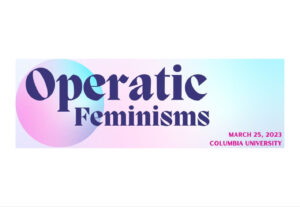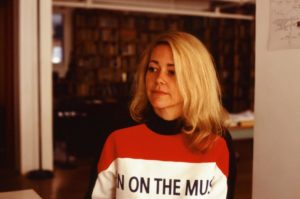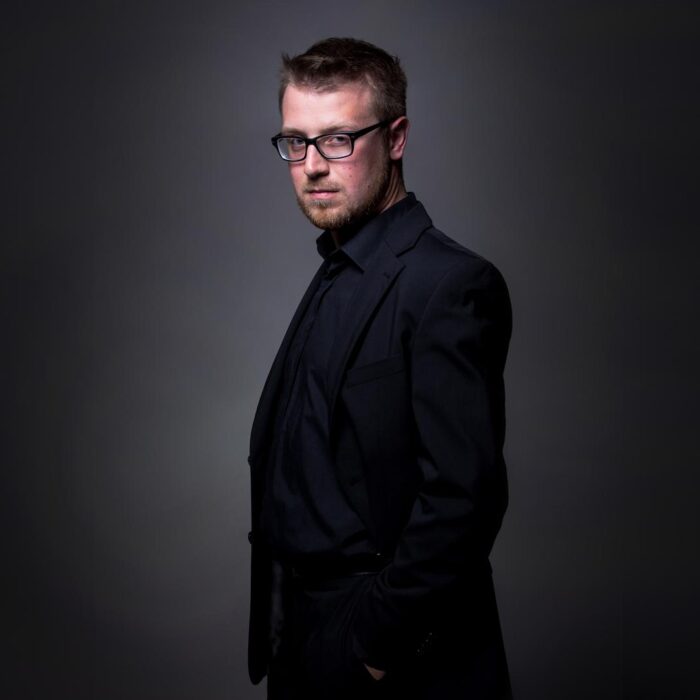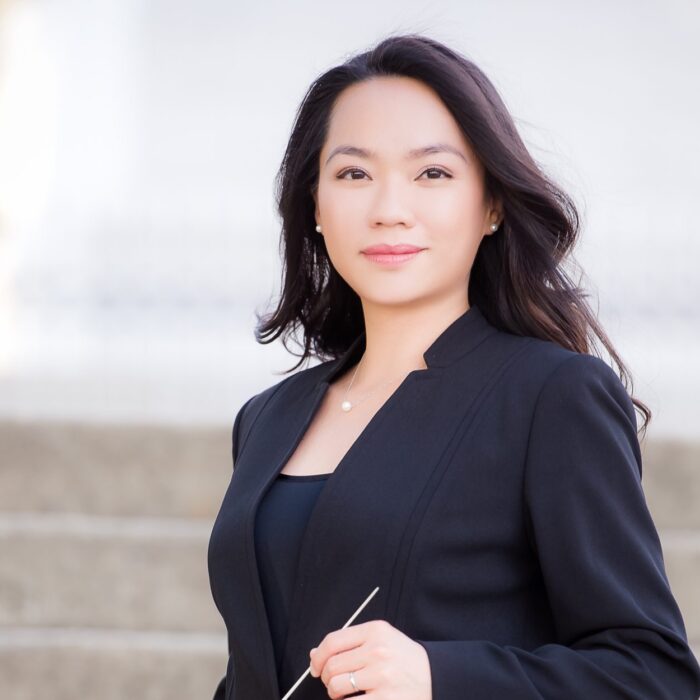
Operatic Feminisms: Women and Femmes on and off the Opera Stage
An event that bridges the worlds of scholarship, performance, and criticism to think through the possibilities for feminist opera studies and women in opera in the twenty-first century.
By Jennifer PyronThe graduate students of the Department of Music at Columbia University held a day-long symposium, “Operatic Feminisms: Women and Femmes on and off the Opera Stage,” on Saturday, March 25th, 2023. Project Chair Gabrielle Ferrari and Project Co-Chair Lauren Shepherd hosted attendees at the special event showcasing in-depth discussions by Anne Midgette, Dr. Candace Magner, Eric Balboni, Eugenia Forteza, Megan Gillis, and Dr. Niloufar Nourbakhsh.
There were also panels throughout the day featuring pertinent and insightful discoveries presented by Eric Balboni, Anna Maria College and Fairfield University (“Testosterone and the classical singer: strategies for navigation and exploration”), Samantha Cooper, Harvard University (“American Jewish Women and the Nurturing of New York Opera Culture”), Beth Snyder, University of North Texas (“Debating cosmopolitan utopia–female singers at Glyndebourne in the 1930s”), Anna Valcour, Brandeis University (“Operatic Institutional Responsibility for Sexual Misconduct”), Molly Doran, Wartburg College (“Staging Women’s Trauma on the Twenty-First-Century Operatic Stage: Exploitation vs Ethical Engagement”), and Candace Magner, Cor Donato Editions (“Uncovering Barbara Strozzi: how finding lost music led to publishing her complete works”).
Sasha Doster also held a panel, Columbia University, titled “Opera by Women” with works presented by Amy Zigler, Salem College (‘Believed to be a witch’: An examination of female agency in Ethel Smyth’s “Der Wald”), Jennifer L. Campbell, University of Kentucky (“Song from the Uproar: Missy Mazzoli, Isabelle Eberhardt, and Feminist Voice”), and Marysol Quevedo, University of Miami (‘Sisters of the clear waters’: Afro-diasporic Womanhood in Tania León’s “Oh Yemanja”).
Live performances took place between discussions that included Hildegard von Bingen’s “Ordo Virtutum,” Barbara Strozzi’s “Lagrime Mie,” directed by Liz Kiger, and the world premiere of three new works commissioned for the occasion. “The Boughs,” a one-act opera for women’s voices written especially for Barnard-Columbia’s New Opera Workshop by Tanner Porter, and two recently commissioned pieces from Columbia-Juilliard undergraduate composers Nicole Balsirow and Sofia Ouyang. There was also a performance of “Marie Justine Favart’s Brian and Brianna” under the musical direction of Gabrielle Ferrari, with the new English edition by Callum Blackmore.
Roundtable Discussions
The entire day was a reminder of the many ways in which opera is continuously evolving through the relentless work of those who believe in such efforts. The most memorable part of the day was the roundtable discussion, where speakers were asked specific questions pertaining to opera and feminism. What follows are ideas that resonated most with this writer during the roundtable. There was a lot more said; however, these are some moments that provoked thought about operatic feminism’s significance as a whole.
Speaking to this idea of creative activism were the women at Gabrielle Ferrari’s “Roundtable: Rethinking Women in Opera, On- and Off-stage”: Eugenia Forteza (founder, host, and lead editor: 360° of Opera), Megan Gillis (co-founder, Executive Director, City Lyric Opera), Anne Midgette (classical music critic, form. Washington Post and The New York Times), Niloufar Nourbakhsh (composer, Co-Director, Iranian Female Composers Association), and Tanner Porter (composer, “The Boughs”).
Gabrielle Ferrari: “Over the course of today, we’ve talked a lot about opportunities for women in opera and also ways in which opera has consistently not been a safe place for women.
“In the last few years, we have seen an increase in the awareness of gender-based discrimination, essentially harassment, in the classical music world, both in conservatories and colleges and also in professional institutions.
“We’ve also seen a significant rise in attacks on the human rights of women across the world. With this in mind, how do you see opera fitting into this particular climate? Both in terms of perpetuating this climate and perhaps as a way to change this climate. Why opera now?”
Eugenia Forteza: “To me, the world we live in right now is like the movie ‘Everything Everywhere All at Once.’ I also think this is how opera is and has always been for me– everything everywhere all at once. Opera is intense and visceral, and loud. It makes people stop and listen. Whether they like it or not, it has a shock effect.
“I think this is embedded in the art form itself and something we can use. Opera can make a huge impact. At the same time, we need to know how to communicate it and how to let people know more about it. I see all of the incredible work being done in opera right now, and I also see all of the missed opportunities. This is where I think the opera world has work to do. However, if opera knows how to do one thing, it is to be loud. This can be taken as a metaphor, too.”
Anne Midgette: “I love that this is where [Eugenia] went when talking about opera because I think that’s something when we talk about opera, we insufficiently discuss the visceral aspects of it. And a lot of the #MeToo stuff that we are discussing, too, opera is really sexy, physical, overwhelming, and overpowering in ways that are good and bad. Part of the #MeToo stuff is the bad side of opera, where people want more of that all the time. But what I also want to say is that we are almost talking about different things, like there is grand opera, which is loud and big. Then there are operas like ‘Song from the Uproar: The Lives and Deaths of Isabelle Eberhardt,’ which is a different type of opera.
“When we talk about contemporary opera today and what it does. It is almost a different animal from ‘Don Carlo’ at the Met. Which is great because it’s like art house film and Steven Spielberg, but to try and lump opera under one heading is just as challenging as when talking about cinema and embracing all of the different genres.
“The other thing I want to say is when we talk about opera today, we often get very hung up on what stories we are telling. This is a buzzword today in a lot of fields. As a journalist, you hear a lot about ‘what stories are you telling?’ One of the great things about opera, however, is that many of the stories are negative toward women in the traditional canon. But the music is doing a lot of heavy lifting. And, rather than being descriptive about what kind of story or dynamic tells a story, it’s about where the story inspires the composer and librettist. The music is working with the story to elevate it, and I think keeping track of this and not wanting to have opera just be a social project is really important.”
Megan Gillis: “There are elements of opera that need to be a social project. There are elements of opera that do relate to what is happening today. For example, my company ended up very unexpectedly producing an opera of ‘Carmen’ during the Brett Kavanaugh hearings and that was such a transformative process, where you’re looking at stories from over a hundred years ago that do relate to what is happening in our society today. Therefore, I do think that opera can be extremely relevant, and these stories that were written hundreds of years ago are extremely important stories that need to be told today. I think it is how we tell them and how we uplift not only women but how we frame the voices of today that is most important and successful.
“People talk a lot about how we are reinventing opera and how we are telling these stories for today’s audiences and think this is almost doing the audience a disservice to think that we need to take opera into an updated version that fits our right now. These stories are incredibly timeless for a reason. It’s how we tell these stories and what we choose to focus on that matters most.”
Eugenia Forteza: “I think it’s important to remember that the best way forward is through building upon what we have instead of trying to erase what happened and start from scratch. We can honor and learn and appreciate what’s been done before us and have both coexist before us. For me, I love both traditional and new opera.”
Gabrielle Ferrari: “Opera is about pulling out the emotional truth. What kind of truths does opera access? What can we think about? Making this our project brings me to my next question about relating to opera in this way. In what ways do you see these types of projects relating to feminism?”
Anne Midgette: “Part of the problem with the way opera, specifically traditional opera, is presented and conceived is that it is in the hands of very few people. Often the audience doesn’t feel empowered to have its own opinion. There have been many times where I’ve seen a production, and the audience comes out at intermission. There are people in the auditorium who don’t actually understand that there’s a commentary happening. They haven’t been given permission to engage with the opera in this way.
“Also, the singers are almost never given permission to do very much at all. You have this very small group of conductor, director, and administration who are dictating everything to almost everybody, and in order to find more truth and relevance in whatever kind of staging, even in the traditional ‘Bohème,’ the more it can be put into the hands of the singers who have so much to say and offer. They are the artists bringing it across, and the more we bring the audience along with us and get rid of this very unhealthy situation where a few people are gatekeeping. The better off we will be with making opera a more collaborative endeavor.”
Eugenia Forteza: “I think when talking about opera as a feminist project, that it starts in school. I’m very much a product of an American conservatory path. Still, I always came with a different perspective which is the one of an international student growing up in South America. I feel like this has allowed me to see a lot of things differently, and along my path, I have seen a lot of positive things and a lot of areas for opportunities.
“I have seen many incredible changes made, and I’ve been very lucky to have had powerful and encouraging female figures in my education. But I think this is weird that I feel like this was just ‘luck.’ It shouldn’t be about luck. I think it starts in the education system for us to really see the changes in the opera industry and companies. This also means more repertoire options, scholarship options, and more opportunities for women.”
Megan Gillis: “I think it’s about singers having choices. We are often talked down to, told what to do, and told how to interpret repertoire. It’s about reframing how we allow singers to have voices.
“In my role as a producer of operas now, what I think is most unfortunate is that I usually spend the first week of rehearsals telling singers that it’s okay to exist there. It’s like we spend so much time trying to break down these barriers and walls to then remember that singers are allowed to be there and allowed to be a person. I believe that real change happens when you give the people on stage doing the work a voice.”
Tanner Porter: “Speaking to what was mentioned earlier about opera’s truth and relevance, from a composer’s perspective, a feminist work for me is one in which a female composer is allowed to be authentic in her own voice. They are not asked to represent men from a female perspective, but instead, they get to use their own voices.
“A composer’s point of view doesn’t have to be for everybody. I look forward to a future in which very hyperspecific perspectives are allowed to exist and be authentic and not have to carry the weight of this idea of ‘excellency.’”
Niloufar Nourbakhsh: “I want to share about Seattle Opera’s ‘A Thousand Splendid Suns’ by composer Sheila Silver and libretto by Stephen Kitsakos, based on the book by Khaled Hosseini, and how for this world premiere at Seattle Opera, they did something very unique.
“They took a risk by deciding to work with a stage director, Roya Sadat, who had never staged an opera in her life. I think this is significant, and I hope more producers and opera companies can feel empowered to take these risks where they can bring in people who are not necessarily in opera but who are wonderful artists with a vision. Roya Sadat has done an amazing job, and I want to see more risks taken like this.”
Categories
News


